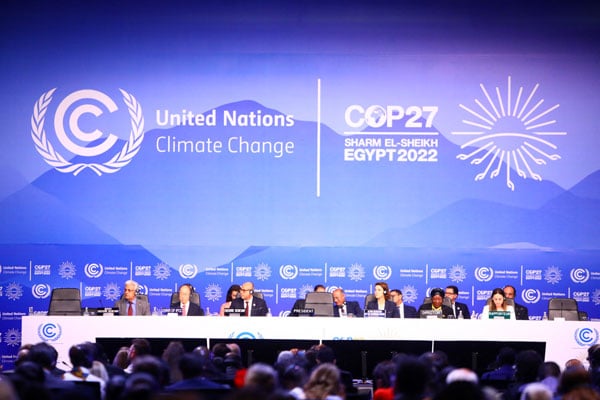COP27 shouldn’t reduce food crisis to a footnote

Delegates attend the opening ceremony of the 2022 United Nations Climate Change Conference, more commonly known as COP27, at the Sharm El Sheikh International Convention Centre, in Egypt's Red Sea resort of the same name.PHOTO / AFP
What you need to know:
The issue: COP27
Our view: We need to get ahead of the climate carnage by—for one—warming up to regenerative farming practices
Food price inflation in Uganda was already mustering surges that were agitating tongues before October’s consumer price index confirmed a year-on-year rise of slightly over 20 percent.
The bad news is that the worst is yet to come. Climate shocks and the impact of the Russia-Ukraine war mean that the troubled present won’t be shed off that easily. Already, Moscow’s decision to walk back a grain (wheat, barley, corn and sunflower) export deal has triggered hair-raising forecasts. Commercial bakers—for whom whole grain flour has a sense that is indispensable to their trade—might be forced to make choices that will not be greeted warmly during the festive period.
All of this comes at a time when the climate crisis has threatened food stocks, leaving an interminable number of people in sub-Saharan Africa facing starvation.
Delegates at the ongoing 2022 United Nations Climate Change Conference or COP27 in Egypt have promised to bend every effort to draw a nexus between human health and planetary health. They have, however, met a less enthusiastic audience from activists like Greta Thunberg who accuse them of providing a lot of hot air but no liftoff.
We join Ms Thunberg in condemning the ‘greenwashing’ and urging a sense of urgency in creating a sustainable food system. The aspects of the food system that are not working in the interest of either consumers or farmers have to be interrogated with the end goal of finding a lasting solution. A litany of structural problems have, however, contrived to hold Ugandan farmers captive to rain-fed agriculture and chemical fertilisers. This bond—that has made access and affordability in food markets such a complicated and slow process—ought to be loosened if not quashed.
It should not be lost upon the delegates at the Sharm el-Sheikh summit in Egypt that the vast bulk of the poor being failed by the broken food system are in Africa. The Food and Agriculture Organisation’s latest quarterly global report revealed that 33 of the 45 countries that find themselves “requiring external assistance for food” are in Africa. Uganda—in case you are wondering—contributes to Africa’s 33-strong tally. The United Nations has designated November 15, 2022 as the Day of Eight Billion. If eight billion mouths are to be fed, the world will need to transition to a more resilient food system. We shouldn’t kick the can down the road and hope for the proverbial manna and quail to drop from Heaven.
We need to get ahead of the climate carnage by—for one—warming up to regenerative farming practices. Climate-smart agriculture should suffice if anything because a third of the planet-heating gases attributable to human activity come from food production. All of which means that food should be more than a footnote at COP27. The global food price inflation demands as much.
Our commitment to you
We pledge:
- To be accurate and fair in all we do.
- To be respectful to all in our pursuit of the truth.
- To refuse to accept any compensation beyond that provided by Monitor Publications Ltd. for what we do in our news gathering and decision-making.
Further, we ask that we be informed whenever you feel that we have fallen short in our attempt to keep these commitments.



